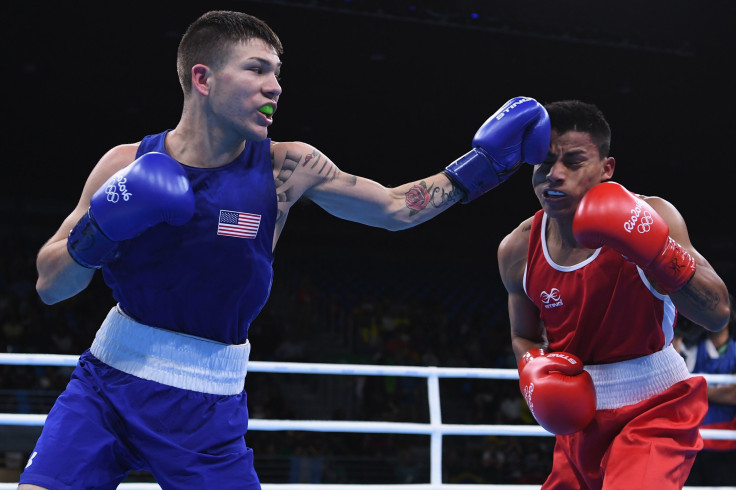Olympic Boxing 2016: Nico Hernandez, Team USA Fighters Look To Become Stars In Rio

For the first time in eight years, the United States men’s boxing team is guaranteed to win a medal. Nico Hernandez advanced to the medal round of the light flyweight division on Tuesday, earning himself at least a bronze at the 2016 Rio Olympics.
Hernandez is considered a longshot to win the gold, but even if he doesn’t finish in first place, he’ll find himself in impressive company. Deontay Wilder was the last American to medal at the Olympics, and since taking home the gold in Beijing in 2008, he’s become the WBC heavyweight champion.
Other recent American Olympians include Andre Ward, who won gold as a light heavyweight in 2004 and is one of the world’s best pound-for-pound fighters. Eight years prior, Antonio Tarver won the bronze medal in the same division, going on to become a light heavyweight and heavyweight champion as a pro.
Oscar De La Hoya became one of the most memorable Olympic boxers when he took home the gold for Team USA as a lightweight in 1992. He went on to become an all-time great, winning titles in six different weight classes, but he still puts his Olympic gold medal above any of those championships.
“To this day it’s obviously the most memorable experience that I probably will ever have in boxing,” De La Hoya told International Business Times in a phone interview. “The Olympic gold, just being in the Olympics was just such a surreal moment for me. It’s one of those moments where it’s hard to describe, but at the same time, I can relive every single second of every single moment. From listening to the national anthem, getting that gold medal around my neck. It was a beautiful experience.”
De La Hoya grabbed attention for his story outside the ring. It was well-known that he was hoping to win a gold medal for his mother that had passed away just months earlier, and his soft-spoken and humble persona was considered refreshing for a brutal sport.
“You’re on that international stage,” De La Hoya said. “If you have a compelling style and a compelling story behind you and the world falls in love with you and you win the gold, the sky’s the limit. You come back as a hero and therefore your professional career is amplified 100 times over, compared to not winning a gold or not participating in the Olympic Games. The Olympic stage is a huge deal to any athlete, especially a boxer, because a boxer has the opportunity to turn pro and make some serious money.”
The rules in Olympic boxing have changed since De La Hoya was representing the U.S. 24 years ago. For the first time ever, professionals are allowed to compete in the Games, though only three boxers took advantage of the rule this year. The way fights are scored has also changed with the Olympics moving to the 10-point scoring system that’s used in the pros. Previously, Olympic bouts were decided by a computer punch-count system.
But the biggest change is the removal of headgear. For the first time since 1980, Olympic boxers are not wearing headgear during their three-round fights. Less than a week into the Rio Games, the change has already had a noticeable impact.
The Associated Press notes that at least 10 boxers have suffered significant facial cuts through the first five days of fights. Boxers are taking on more punishment while still being forced to fight multiple times over the course of just a few days. Hernandez has already fought three times, and he’ll need to win two more fights in order to win the gold medal.
De La Hoya thinks there are both benefits and drawbacks to the removal of headgear in Rio.
“I’m kind of torn in between it because a lot of these kids can get knocked out or seriously injured. But at the same time, if you’re fighting on international TV, the exposure that you’re getting, they can see your face, they can recognize who you are. It takes me back to the days when I remember Sugar Ray Leonard in the 1976 Olympics, having no head gear and I immediately recognized him and was able to identify him because of not having the head gear inside that ring. So it’s a double-edged sword for me, but I think as long as nobody gets injured or seriously hurt I think it’s OK.”
Entering Day 6 of the 2016 Olympics, there haven’t been any knockouts in Rio and no boxers have suffered major injuries. Tuesday’s lightweight fight between Russia's Adlan Abdurashidov and Algeria's Reda Benbaziz had to be stopped twice because of blood, and Benbaziz said he expects a cut he incurred above his eyebrow to affect his next quarterfinal fight on Friday.
But Hernandez is in fine condition after nine rounds of boxing, and he’s hoping his journey ends with a gold medal. Team USA’s Carlos Balderas Jr. is one of just eight lightweights that remain in contention, and Gary Russell advanced to the Round of 16 as a light welterweight. Men’s flyweight boxing begins on Saturday, and USA’s Antonio Vargas is one of the favorites to take home a medal.
After a disappointing finish at the 2012 Olympics, Team USA has a chance to win multiple medals and produce a few of boxing’s future stars.
"I'm definitely excited about getting to this level and where I'm at, but I'm not satisfied with a bronze medal," Hernandez said after advancing to the medal round. "I came here to get gold so that's what I am going to continue to work towards. I don't want to lose in front of my parents. I'll be satisfied once I get the gold."
© Copyright IBTimes 2024. All rights reserved.












